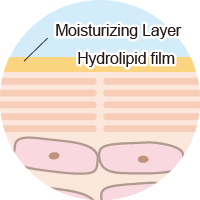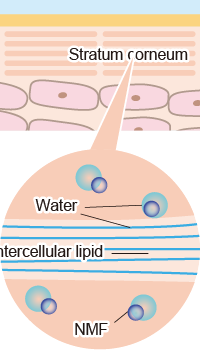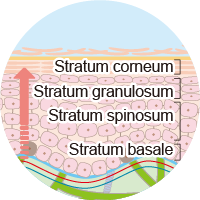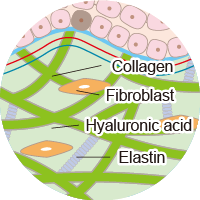
Structure of the Skin
 Moisturizing Layer
Moisturizing Layer

Moisturizing Function Of The Hydrolipid Film
This is a membrane of water and fat (lipids) generated by the body that helps keep the skin radiant and supple. It is also known as the skin surface lipid (SSL) film. The hydrolipid film augments the barrier function of the stratum corneum (outermost layer of the epidermis) to protect the body from ultraviolet light, heat, water, bacteria and other external factors, and also helps prevent the skin from becoming dry. The amount of sebum excreted by the body declines as we get older and this can result in dry skin. However, if there is too much sebum it can oxidize and damage the skin, resulting in a dull appearance due to grease or dirt, and it can also cause blackheads, acne, or result in make-up that comes off easily.
Skincare Advice
Always use a cleansing cream or lotion that does not stress the skin, and wipe away any excess oil to keep your skin clean and fresh. It is also important to remember that you should not rub your skin hard when washing; otherwise you will remove all the natural oil (sebum) that keeps the skin supple. After washing your face, apply a moderate amount of natural moisturizer to prevent drying and help protect the skin.
This is a membrane of water and fat (lipids) generated by the body that helps keep the skin radiant and supple. It is also known as the skin surface lipid (SSL) film. The hydrolipid film augments the barrier function of the stratum corneum (outermost layer of the epidermis) to protect the body from ultraviolet light, heat, water, bacteria and other external factors, and also helps prevent the skin from becoming dry. The amount of sebum excreted by the body declines as we get older and this can result in dry skin. However, if there is too much sebum it can oxidize and damage the skin, resulting in a dull appearance due to grease or dirt, and it can also cause blackheads, acne, or result in make-up that comes off easily.
Skincare Advice
Always use a cleansing cream or lotion that does not stress the skin, and wipe away any excess oil to keep your skin clean and fresh. It is also important to remember that you should not rub your skin hard when washing; otherwise you will remove all the natural oil (sebum) that keeps the skin supple. After washing your face, apply a moderate amount of natural moisturizer to prevent drying and help protect the skin.
 Protective Barrier
Protective Barrier

Function Of The Stratum Corneum
The stratum corneum of the skin is a thin 0.02 mm film, no thicker than the cling film used to wrap food. It covers the whole body and prevents moisture loss from the body while also protecting the body from the external environment. The horny cell layer of the stratum corneum is built up of layers of keratinized cells, or keratinocytes, in much the same way that a wall is built up of layers of bricks. The space between these cells consists of intercellular lipids that contain water and sebum, which act as the cement holding the “bricks” together, and this along with the water content and the natural moisturizing factor (NMF) of the stratum corneum keep the skin firm and maintain its moisture balance.
Skincare Advice
If the stratum corneum becomes dry, its effectiveness as a protective barrier deteriorates and the skin becomes very sensitive to external factors and this often leads to skin problems. It is therefore important to maintain the right balance of moisture and oil in the skin and reinforce the protective barrier of the stratum corneum. The stratum corneum is sensitive to friction and rubbing, so it is important to apply skin care gently without rubbing too hard.
The stratum corneum of the skin is a thin 0.02 mm film, no thicker than the cling film used to wrap food. It covers the whole body and prevents moisture loss from the body while also protecting the body from the external environment. The horny cell layer of the stratum corneum is built up of layers of keratinized cells, or keratinocytes, in much the same way that a wall is built up of layers of bricks. The space between these cells consists of intercellular lipids that contain water and sebum, which act as the cement holding the “bricks” together, and this along with the water content and the natural moisturizing factor (NMF) of the stratum corneum keep the skin firm and maintain its moisture balance.
Skincare Advice
If the stratum corneum becomes dry, its effectiveness as a protective barrier deteriorates and the skin becomes very sensitive to external factors and this often leads to skin problems. It is therefore important to maintain the right balance of moisture and oil in the skin and reinforce the protective barrier of the stratum corneum. The stratum corneum is sensitive to friction and rubbing, so it is important to apply skin care gently without rubbing too hard.
 Skin Turnover
Skin Turnover

Function of the Epidermis
The epidermal cells produced by the stratum basale (innermost layer of the epidermis) push their way up through the other layers to the stratum corneum and then form the horny cell layer on the surface of the skin. These cells are then shed as dead cells and replaced by new cells coming through from below. This continuous renewal of the layers of the skin is known as “turnover”. If this turnover cycle functions smoothly, the stratum corneum acts as an effective barrier. The turnover cycle is 28-days long in adults. If this cycle is disrupted and become shorter or longer, then the production of the skin’s natural moisturizing factor and intercellular lipids is also disrupted and the skin loses its radiance and can become coarse.
Skincare Advice
Applying moisture and nourishing to the skin augments its effectiveness as a barrier protecting it from dehydration, damage from ultraviolet rays and the external environment. It also helps maintain the natural turnover cycle. When this turnover cycle runs smoothly, old, dead cells are pushed to the surface and shed, keeping the skin naturally moist and radiant. To ensure this process is not disrupted, it is important to use skin care products that do not stress the skin. It is also important to maintain a good diet, get enough sleep and follow a healthy lifestyle.
The epidermal cells produced by the stratum basale (innermost layer of the epidermis) push their way up through the other layers to the stratum corneum and then form the horny cell layer on the surface of the skin. These cells are then shed as dead cells and replaced by new cells coming through from below. This continuous renewal of the layers of the skin is known as “turnover”. If this turnover cycle functions smoothly, the stratum corneum acts as an effective barrier. The turnover cycle is 28-days long in adults. If this cycle is disrupted and become shorter or longer, then the production of the skin’s natural moisturizing factor and intercellular lipids is also disrupted and the skin loses its radiance and can become coarse.
Skincare Advice
Applying moisture and nourishing to the skin augments its effectiveness as a barrier protecting it from dehydration, damage from ultraviolet rays and the external environment. It also helps maintain the natural turnover cycle. When this turnover cycle runs smoothly, old, dead cells are pushed to the surface and shed, keeping the skin naturally moist and radiant. To ensure this process is not disrupted, it is important to use skin care products that do not stress the skin. It is also important to maintain a good diet, get enough sleep and follow a healthy lifestyle.
 Spring And Elasticity
Spring And Elasticity

Function Of The Dermis
The dermal layer contains fibrous material known as collagen and elastin, along with hyaluronate and other mucopolysaccharides. These are produced in the fibroblastic cells (fibroblasts) of the dermis, and are continually generated by our metabolism. Collagen supports elastin in providing the support structure in the dermis and forms a spacial network that gives the skin its natural spring and elasticity. Hyaluronate (hyaluronic acid), which helps the skin retain water, is embedded between these layers and maintains the spring and moisture content of the dermis.
Skincare Advice
If the skin is exposed to strong ultraviolet rays, it is subjected to chafing and stretching that damages the smooth functioning of collagen and elastin, which can result in wrinkles and sagging. It can also cause the skin to become coarse or sallow. We recommend that you avoid exposure to strong ultraviolet light and stressing the skin, and use skincare products that help maintain the skin’s moisture content and enhance its barrier function.
The dermal layer contains fibrous material known as collagen and elastin, along with hyaluronate and other mucopolysaccharides. These are produced in the fibroblastic cells (fibroblasts) of the dermis, and are continually generated by our metabolism. Collagen supports elastin in providing the support structure in the dermis and forms a spacial network that gives the skin its natural spring and elasticity. Hyaluronate (hyaluronic acid), which helps the skin retain water, is embedded between these layers and maintains the spring and moisture content of the dermis.
Skincare Advice
If the skin is exposed to strong ultraviolet rays, it is subjected to chafing and stretching that damages the smooth functioning of collagen and elastin, which can result in wrinkles and sagging. It can also cause the skin to become coarse or sallow. We recommend that you avoid exposure to strong ultraviolet light and stressing the skin, and use skincare products that help maintain the skin’s moisture content and enhance its barrier function.
 Complexion
Complexion
Function Of The Capillaries
Relaxation, moderate exercise, better sleep, and a balanced diet are all important in maintaining a good complexion. They help reduce the effects of seasonal factors and ageing on our complexion and ensure good circulation. Soaking in a leisurely bath and attentive skin care can contribute to improved complexion. So, why not relax in a hot bath before applying skin care treatments.
Skincare Advice
Relaxation, moderate exercise, better sleep, and a balanced diet are all important in maintaining a good complexion. They help reduce the effects of seasonal factors and ageing on our complexion and ensure good circulation. Soaking in a leisurely bath and attentive skin care can contribute to improved complexion. So, why not relax in a hot bath before applying skin care treatments.
Relaxation, moderate exercise, better sleep, and a balanced diet are all important in maintaining a good complexion. They help reduce the effects of seasonal factors and ageing on our complexion and ensure good circulation. Soaking in a leisurely bath and attentive skin care can contribute to improved complexion. So, why not relax in a hot bath before applying skin care treatments.
Skincare Advice
Relaxation, moderate exercise, better sleep, and a balanced diet are all important in maintaining a good complexion. They help reduce the effects of seasonal factors and ageing on our complexion and ensure good circulation. Soaking in a leisurely bath and attentive skin care can contribute to improved complexion. So, why not relax in a hot bath before applying skin care treatments.



